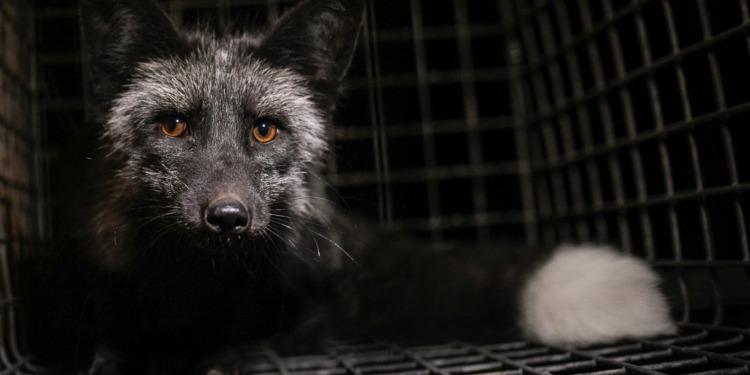The next pandemic could be closer than we think, and a key to preventing it lies in redefining our relationship with animals. Zoonotic diseases — those passed from animals to humans — make up around 75% of all new infectious diseases. From the severe acute respiratory syndrome (SARS) outbreak in the early 2000s to the devastation of COVID-19, history has shown the catastrophic potential of these diseases.
But it is not just human health that is at stake: zoonotic diseases decimate local wildlife populations, including endangered species, triggering loss in biodiversity and destabilizing our already fragile ecosystems. As these diseases ripple through economies, the end result can be soaring healthcare costs, hamstrung economic productivity, and major disruptions to agriculture.
The culprits: Industrial animal agriculture and wildlife exploitation
Escalating demand for animal protein, coupled with unsustainable agricultural practices, deforestation, and wildlife exploitation, are some of several ways we humans contribute to the emergence of zoonotic diseases.
Industrial animal agriculture, with its cramped spaces, inadequate nutrition, and reliance on high-performance breeds that are prone to illnesses, is particularly culpable. On-farm stressors, the European Medicines Agency (EMA) and the European Food Safety Agency (EFSA) concluded, “interfere with the normal behaviour of the animals and have been shown to alter the immune system of animals and susceptibility to diseases.”
For perspective, a recent study found that over half of 2,500 European pig farms, which predominantly use industrial farming methods, had a year-round presence of major swine influenza A virus lineages. These lineages hold the potential to spark new human pandemic viruses.
The same applies to capturing, breeding, transporting, and trading wild animals which can compromise their welfare and suppress their immune systems, exacerbating disease vulnerability. Live animal markets, evidenced by the SARS epidemic linked to civet cats, have repeatedly been recognized as hubs for disease transmission.
Moreover, the rapid encroachment of farmland into forests and wetlands puts farmed animals in dangerous proximity to wildlife that could be harboring the next big zoonotic disease. Through such habitat intrusions, farm animals can become a bridge, exposing humans to wildlife-borne microbes and setting the stage for potential pandemics. Industrialized animal farms can further facilitate the evolution of more virulent pathogens from their less harmful wild types, as is the case with highly pathogenic avian influenza (HPAI), which is often generated in commercial poultry farms. Crowding thousands or tens of thousands of genetically identical animals creates a perfect mixing vessel for microbes to mutate into more dangerous strains.
Cost-effective prevention: A call to action
While the global value of lives lost to zoonoses is estimated at USD 350 billion annually, an investment of approximately USD 20 billion a year could address the root causes of these diseases. In essence, the cost of prevention is a mere 6% of the yearly value of lives lost. The equation is simple: prioritize animal welfare to reduce the risk of disease emergence and/or re-emergence.
“A certain way to reduce risk of zoonosis and emerging infectious diseases globally (…) is to reduce dependence on intensive animal-based food production systems,” states the IUCN. That is clear. The greater the number of farmed animals, the higher the risk of zoonotic outbreaks.
Related Articles: It’s Time to Get Serious About Preventing Pandemics | The Global Health System Needs More “Prevention” To Address Future Pandemics | Health Threats: Can We Do Better in the Future? | One Health: The International Community Takes A New Step Forward
In addition, promoting good animal welfare practices is pivotal. This entails providing animals with ample space, ventilation, and good nutrition to strengthen their immune systems, while ensuring proper sanitation measures, among others. Such prevention strategies fortify the first line of defense against diseases.
Recommendations for the road ahead
Since late 2021, member States of the World Health Organization (WHO) have been negotiating a treaty to strengthen pandemic prevention, preparedness, and response. The talks towards such a legal instrument are planned to conclude in 2024.
The treaty provides member States with an opportunity to apply the insights gained from the recent pandemic. By addressing animal welfare, countries can prevent pandemics at the source and shield the world from experiencing another devastating shock. Doing so would mean giving more emphasis to the pre-outbreak stage of the prevention phase within the instrument. Specifically:
- Recognizing activities and hotspots that augment spillover risk;
- Adopting a highly precautionary approach to risk, aiming to phase out practices that increase the likelihood of disease spillover;
- Dedicating resources to address the root causes of pandemics, aiding communities in transitioning away from high-risk practices; and
- Ensuring a cohesive One Health approach that integrates human, animal, and environmental health perspectives.
It is encouraging to see that the draft Political Declaration, expected to be adopted at the High-level Meeting on Pandemic Prevention, Preparedness, and Response on 20 September 2023, recognizes “the necessity of a One Health approach that fosters cooperation between the human, animal and plant health.”
By investing in animal welfare and sustainable practices, we are not just safeguarding animals — we are ensuring the health and well-being of our global community. The next pandemic can be prevented. The choice is ours.
— —
This article, originally published by the International Institute for Sustainable Development (IISD) and republished here as part of an editorial collaboration with IISD, was authored by Silvia Mantilla,
Communications Manager at the World Federation for Animals.
Editor’s Note: The opinions expressed here by the authors are their own, not those of Impakter.com — Featured Photo Credit: Andrew Skowron / We Animals Media.










